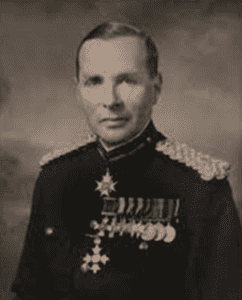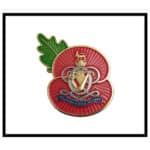Major General Ralph Younger, Colonel of the 7th Hussars from 1952 and of The Queen’s Own Hussars from amalgamation to 1961, died on the 5th of August 1985 aged 81.

The present Colonel of the Regiment read the Lesson at the Funeral at Melrose. At the Memorial Service at St James’s, Piccadilly, the Address was given by Field Marshal Sir John Stanier, GCB, MBE, who himself served in the Regiment from 1946 to 1966, when he left to command The Royal Scots Greys.
An extract from this Address tells of General Ralph’s time in the Regiment:
“Ralph was first and foremost a cavalry soldier.
He joined the 7th Hussars in Tidworth in 1926, in that brittle and difficult time between the wars when the cavalry regiments were still horsed, despite the terrible experiences of the First World War. Indeed for the first 10 years of Ralph’s service, he was to serve with horses. Hunting, racing, show-jumping and polo occupied much of those early years spent in Tidworth, Aldershot and latterly in Egypt.
It was a life that Ralph entered into wholeheartedly and thoroughly enjoyed. The 7th Hussars was a regiment with a very special atmosphere; in that regiment, the greatest crime was to be dull. There was no need to conform absolutely; indeed a measure of eccentricity was tolerated if not encouraged. But there was no room or time for dullness.
In those years, Ralph grew up with a group of men of strong character, as he was himself. Of those who are sadly no longer with us, one remembers men like Freddy Byass, Francis Jayne, Tim Llewillen Palmer and Delmé Seymour Evans, to name but a few. All of them were to earn great reputations in the war years that lay ahead,
In 1936, the first step in preparation for that war was taken when the Regiment was mechanised. Frail and lightly armoured vehicles took the place of their previous horses, and new forms of training had to be undertaken. In 1938, Ralph married Greta, who was to be his staunchest and most wonderful support for the remainder of his life.
When the war broke out, the 7th and their sister regiment the 11th Hussars were among the first British troops to make contact with the enemy on the Egyptian frontier. At that time Ralph was in command of ‘B’ Squadron, an appointment which he held for three and a half years throughout the most severe
fighting in the desert campaigns that were to follow.
The 7th was always in the thick of the fighting, and Ralph’s second in command, George Murray Smith, recalls that Ralph was one of the bravest men he ever met.
After the battle of Sidi Rezegh, which claimed so many regimental casualties, Ralph in common with many other officers and men of the Regiment was decorated for gallantry. He was awarded a Military Cross.
But the 7th was not to stay much longer in the desert. In 1942, as a belated reinforcement to hold the Japanese advance westward towards India, the Regiment, with Ralph as second in command to Rhino Fosdick, was sent to Burma. They landed at Rangoon in 1942 and were immediately engaged in
operations against the Japanese, which led to the long withdrawal out of Burma partly in tanks and partly on foot. In this withdrawal, Ralph played a key role.
Ralph however did not remain with the 7th in Burma. He had served with the Regiment almost without a break for sixteen and a half years. He was now to join his second regiment, the 3rd Carabiniers.
He commanded them when they won their premier battle honour, Nunshigum, and led them back through Burma until the end of the war. Field Marshal Lord Slim later said that he was one of the very best officers under his command in the XIVth Army, He was awarded the DSO,
After the war, he commanded The Royal Scots Greys and soon after this 7th Armoured Brigade, in which the 7th Hussars were serving. Ten years after handing over as Colonel of The Queen’s Own Hussars, General Ralph was asked at the age of 68 to become the first Colonel of the amalgamated Royal Scots Dragoon Guards. He was uniquely fitted for this appointment having commanded both Regiments.
He had a remarkable record of service to his country: Deputy Lieutenant, Justice of the Peace, Master of Foxhounds, a member of The Royal Company of Archers, a steward at several Northern race meetings, Commandant of the Army Cadet Force in Scotland and Chairman of his Territorial Association.
Until his final illness at the age of 80 General Ralph was the most loyal and constant supporter of The Queen’s Own Hussars. We will remember him with pride and affection as not only one of the greatest soldiers of his era but of all of those who have served in the Regiment since 1685.
Our deepest sympathy goes to Greta, his son Colonel David and his daughter Rosemary.
Related topics
- A short history of The 7th Hussars
- A short history of The Queen’s Own Hussars
- Timeline: Middle East (Egypt and Libya)
- Timeline: Burma 1942
- Gallantry Award: Citation and Award of The Distinguished Service Order – Lt Col R Younger, MC, 7H
- Gallantry Award: Citation and Award of The Military Cross – Maj R Younger, 7H



